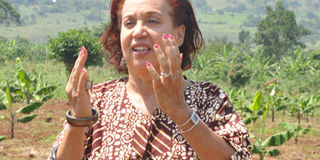Ugandans urged to create academic affiliations for a global work force

Prof. Kigozi. PHOTO BY R. MABALA
What you need to know:
About academic affiliations. These are education partnering among institutions at various levels. They can be either, long distance, global or local academic affiliations depending on what parties agree to offer.
As the world increasingly becomes a global village, experts are urging Ugandan education institutions to start training a labour force that can compete on an international market.
Dr Maggie Kigozi, the former Executive Director of the Uganda Investment Authority (UIA), said to partly solve the rampant unemployment levels in Uganda, education institutions needed to create affiliations in order to train students in competences applicable wherever they may go in the world.
“Creating affiliations with international institutions is a better idea to start venturing in for many Ugandan education institutions. The world has become a global village, where our local manpower needs to compete favourably on the international scene,” Ms Kigozi (pictured) said.
She made the remarks recently during the graduation function at Kabojja International School, Buziga in Kampala where 83 students were passed out.
The students graduated with Cambridge University of London certificates for curriculum classes of year 11 and 13, which are an equivalent of Ordinary and Advanced levels respectively in the Uganda curriculum settings.
An associate professor at Makerere University and a business consultant, Dr Kigozi advised institutions to explore opportunities such as affiliations since government had liberalised the education sector.
Mr Sam Turya, the principal Kabojja International School, said the institution was an opportunity for both international and Ugandan students to be mentored at a level they would otherwise have got abroad.
“We prepare our students to meet international demands. Students are exposed to the same system they would find if they travelled to study in London. They sit for Cambridge exams and the whole curriculum is engineered from the Cambridge University,” he said.
Orienting local workforce
Mr Turya noted that after realising that it would be expensive to import labour from abroad, they started retraining local teachers with the basics in manning an international course.
“We decided to establish a staff skills development department, wherein we equip our local manpower with the skills to handle international courses, because such labour is reliable and readily available. That way our students are fully baked with skills necessary to meet the global challenges,” he explained.




